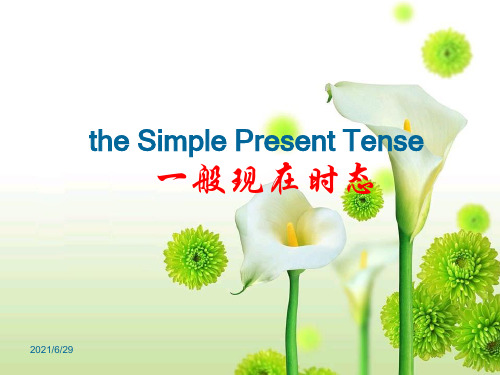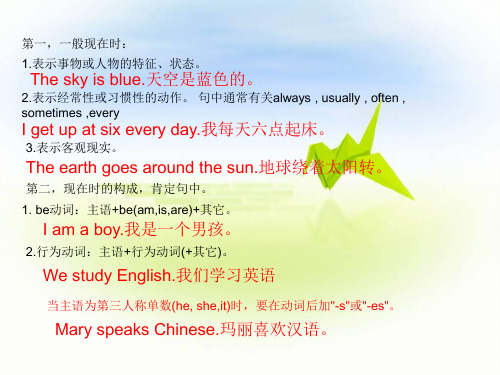超详细一般现在时讲解ppt课件
合集下载
《一般现在时》PPT课件

一、Language focus 描述发展趋势——名词、动词、形、副、 现在完成时 连接词but 和so 描述家庭生活和关系 二、描述发展趋势——名、动、形、副 1. 描述发展趋势——名、动、形、副可观课 本 Activity 1 P38
n. A rise An increase
V. to go up to increase to rise V. to decline to decrease to go down to fall
}
Exercise:
Activity 5 Workbook Activity 7
5.复习一般过去时 一般过去时常用于表示过去某一时间或过去一段时期内发生的事件 或动作 When I was little girl, my brothers and I collected stamps for many years. 6.复习过去进行时 过去进行时表示用于描述过去某一时刻或过去某阶段正在进行的动作 As we burst in, my mother was standing behind the counter. When we were having lunch, my mother told us an interesting story. 7.一般过去时和过去进行时的疑问句形式 疑问句+did+主+V原+...? 疑问句+was+主+Ving+…..? What were you doing last night? When did she leave ? Exercise : Activity 12 . 13
3.复习现在进行时 构成:be + v. ing 用法:现在进行时用于表示现正在发生蔌 现阶段正在进行的动作。 He is listening to the radio. I am watching TV. 状态动词不用于进行时态。 复习否定式和疑问式再举例。 P4
n. A rise An increase
V. to go up to increase to rise V. to decline to decrease to go down to fall
}
Exercise:
Activity 5 Workbook Activity 7
5.复习一般过去时 一般过去时常用于表示过去某一时间或过去一段时期内发生的事件 或动作 When I was little girl, my brothers and I collected stamps for many years. 6.复习过去进行时 过去进行时表示用于描述过去某一时刻或过去某阶段正在进行的动作 As we burst in, my mother was standing behind the counter. When we were having lunch, my mother told us an interesting story. 7.一般过去时和过去进行时的疑问句形式 疑问句+did+主+V原+...? 疑问句+was+主+Ving+…..? What were you doing last night? When did she leave ? Exercise : Activity 12 . 13
3.复习现在进行时 构成:be + v. ing 用法:现在进行时用于表示现正在发生蔌 现阶段正在进行的动作。 He is listening to the radio. I am watching TV. 状态动词不用于进行时态。 复习否定式和疑问式再举例。 P4
(完整版)一般现在时课件

一般疑问句: Be+主语+表语?
Are your parents doctors? Yes, they are./No, they aren’t. Is Mr Long 28 years old? Yes, he is./No, he isn’t.
2021:表示行为动作的词语
3. 经常、习惯、反复做的事情 We have lunch at 12:30. We go to school on Monday.
2021/6/29
be 动词的一般现在时:
be: am, is, are
用be动词的适当形式填空: I ‗a‗m‗‗ he‗‗is‗‗ she ‗i‗s‗‗
iti‗s‗‗‗ Tomis‗‗‗‗
否定句:
☺主语(I/We/You/They)+do+ not+动词原形+其他 I don’t watch TV on Sunday. ☺主语(He/She/It)+does +not+动词原形+其他 He doesn’t watch TV at home on Sunday.
2021/6/29
Practice:
5. 特殊情况 have– has
把下面的行为动词变为第三人称单数形式:
go―goes
carry―carries ride―rides
open―opens
have ― has
teach―teaches brush― brushes dey―deys
play―plays
finish―finishes
2021/6/29
1.一般情况直接加s e.g. reads, plays, works, makes
八大时态讲解(共26张PPT)

He is going to buy her some flowers.
0 一般过去将来时:
He was sixty-eight. In two years he would be seventy.
I knew you would agree.
0 现在英进行语时的: 动词时态(进行) What are you doing?
算;
如:I am going to listen to music. (我打算听音乐) will /shall 表示未事先思考或为计划过的意图
如:It will be Christmas soon .(很快就圣诞节了)
4. 现在进行时态( The Present Continuous Tense )
5、我们离开广州六年了。
We have left Guangzhou for 6 years . ×
We have been away from Guangzhou for 6
years .
3.常见句型
1) 主句(现在完成时)+since 从句(一般过去时).
2) It is +一段时间+ since 从句(一般过去时).
has gone to
He said had seen this morning, …ago, etc
that he _________the film many 如果明天不下雨,我们将去野营。
He has borrowed the pen for three days .
times. 现在进行时态( The Present Continuous Tense )
was /were going to +动词原形
0 一般过去将来时:
He was sixty-eight. In two years he would be seventy.
I knew you would agree.
0 现在英进行语时的: 动词时态(进行) What are you doing?
算;
如:I am going to listen to music. (我打算听音乐) will /shall 表示未事先思考或为计划过的意图
如:It will be Christmas soon .(很快就圣诞节了)
4. 现在进行时态( The Present Continuous Tense )
5、我们离开广州六年了。
We have left Guangzhou for 6 years . ×
We have been away from Guangzhou for 6
years .
3.常见句型
1) 主句(现在完成时)+since 从句(一般过去时).
2) It is +一段时间+ since 从句(一般过去时).
has gone to
He said had seen this morning, …ago, etc
that he _________the film many 如果明天不下雨,我们将去野营。
He has borrowed the pen for three days .
times. 现在进行时态( The Present Continuous Tense )
was /were going to +动词原形
初中英语一般现在时精讲对比现在进行时讲解ppt课件

A keep B kept C have kept D keeps
some
寒假来临,不少的高中毕业生和大学 在校生 都选择 去打工 。准备 过一个 充实而 有意义 的寒假 。但是 ,目前 社会上 寒假招 工的陷 阱很多
【用法2】表示客观真理或客观事实。
【例句】 Light travels in a straight line. 光沿直线传播。
A. you are convenient
B. you will be convenient
C. it is convenient for you
D. it will be convenient to you
寒假来临,不少的高中毕业生和大学 在校生 都选择 去打工 。准备 过一个 充实而 有意义 的寒假 。但是 ,目前 社会上 寒假招 工的陷 阱很多
often, usually, seldom, every day等时间状语。
2. 特别注意动词的第三人称单数形式,也就是主谓一致原则。
3.everyday也可用于过去in the past,将来时in the future.
寒假来临,不少的高中毕业生和大学 在校生 都选择 去打工 。准备 过一个 充实而 有意义 的寒假 。但是 ,目前 社会上 寒假招 工的陷 阱很多
寒假来临,不少的高中毕业生和大学 在校生 都选择 去打工 。准备 过一个 充实而 有意义 的寒假 。但是 ,目前 社会上 寒假招 工的陷 阱很多
时态
பைடு நூலகம்时间
寒假来临,不少的高中毕业生和大学 在校生 都选择 去打工 。准备 过一个 充实而 有意义 的寒假 。但是 ,目前 社会上 寒假招 工的陷 阱很多
时间轴 过去 现在 将来
—They have advantages in different aspects. Tom spends as much time reading as John _________.
some
寒假来临,不少的高中毕业生和大学 在校生 都选择 去打工 。准备 过一个 充实而 有意义 的寒假 。但是 ,目前 社会上 寒假招 工的陷 阱很多
【用法2】表示客观真理或客观事实。
【例句】 Light travels in a straight line. 光沿直线传播。
A. you are convenient
B. you will be convenient
C. it is convenient for you
D. it will be convenient to you
寒假来临,不少的高中毕业生和大学 在校生 都选择 去打工 。准备 过一个 充实而 有意义 的寒假 。但是 ,目前 社会上 寒假招 工的陷 阱很多
often, usually, seldom, every day等时间状语。
2. 特别注意动词的第三人称单数形式,也就是主谓一致原则。
3.everyday也可用于过去in the past,将来时in the future.
寒假来临,不少的高中毕业生和大学 在校生 都选择 去打工 。准备 过一个 充实而 有意义 的寒假 。但是 ,目前 社会上 寒假招 工的陷 阱很多
寒假来临,不少的高中毕业生和大学 在校生 都选择 去打工 。准备 过一个 充实而 有意义 的寒假 。但是 ,目前 社会上 寒假招 工的陷 阱很多
时态
பைடு நூலகம்时间
寒假来临,不少的高中毕业生和大学 在校生 都选择 去打工 。准备 过一个 充实而 有意义 的寒假 。但是 ,目前 社会上 寒假招 工的陷 阱很多
时间轴 过去 现在 将来
—They have advantages in different aspects. Tom spends as much time reading as John _________.
一般现在时.语法讲解PPT精品课件PPT17页

40、人类法律,事物有规律,这是不 容忽视 的。— —爱献 生
6、最大的骄傲于最大的自卑都表示心灵的最软弱无力。——斯宾诺莎 7、自知之明是最难得的知识。——西班牙 8、勇气通往天堂,怯懦通往地狱。——塞内加 9、有时候读书是一种巧妙地避开思考的方法。——赫尔普斯 10、阅读一切好书如同和过去最杰出的般现在时.语法讲解PPT精品课件
36、如果我们国家的法律中只有某种 神灵, 而不是 殚精竭 虑将神 灵揉进 宪法, 总体上 来说, 法律就 会更好 。—— 马克·吐 温 37、纲纪废弃之日,便是暴政兴起之 时。— —威·皮 物特
38、若是没有公众舆论的支持,法律 是丝毫 没有力 量的。 ——菲 力普斯 39、一个判例造出另一个判例,它们 迅速累 聚,进 而变成 法律。 ——朱 尼厄斯
6、最大的骄傲于最大的自卑都表示心灵的最软弱无力。——斯宾诺莎 7、自知之明是最难得的知识。——西班牙 8、勇气通往天堂,怯懦通往地狱。——塞内加 9、有时候读书是一种巧妙地避开思考的方法。——赫尔普斯 10、阅读一切好书如同和过去最杰出的般现在时.语法讲解PPT精品课件
36、如果我们国家的法律中只有某种 神灵, 而不是 殚精竭 虑将神 灵揉进 宪法, 总体上 来说, 法律就 会更好 。—— 马克·吐 温 37、纲纪废弃之日,便是暴政兴起之 时。— —威·皮 物特
38、若是没有公众舆论的支持,法律 是丝毫 没有力 量的。 ——菲 力普斯 39、一个判例造出另一个判例,它们 迅速累 聚,进 而变成 法律。 ——朱 尼厄斯
一般现在时和一般过去时ppt课件

carryies do es wash es visit s exercise s enjoy s jump s hhaavse
一般现在时否定式
be + not don’t do / doesn’t do
II 一般现在时的否定式
1.Be 动词的否定式: be + not
I am a teacher.
把下列句子改为否定句
1.My father has an egg for breakfast . My father doesn’t have an egg for breakfast .
2.Li Lei does his homework after school. Li Lei doesn’t do his homework after school.
1. We often __p_la_y_ (play) in the playground. 2. He _g_et_s_ (get) up at six o’clock. 3. _D_o_ you b_r_u_s_h (brush) your teeth every morning? 4. What d_o_e_she usually_d_o_ (do) after school? 5. Danny_s_t_ud_i_e_s (study) English, Chinese, Maths, Science and Art at school. 6. Mike sometimes _g_o_es__(go) to the park with his sister. 7. She w_a_t_ch_e_s (watch) TV with his parents every evening. 8.D__oe_s_ Mike _r_ea_d_(read) English every day?
小学一般现在时-实义动词ppt课件

(2)结尾是s, x, sh, ch, o,前为辅音字母,
watches teaches goes does washes brushes
(3)动词末尾y前为辅音:将y改为i加es: study→studБайду номын сангаасes fly→flies carry→carries cry→cries
但在y前如果为元音则直接加s buys says
Mary speaks Chinese.玛丽喜欢汉语。
1. be动词的变化。
否定句:主语+ be + not +其它。 如:He is not a worker.他不是工人。
一般疑问句:Be +主语+其它。 如:
-Are you a student
-Yes. I am. / No, I'm not.
二、变一般疑问句并作肯定和否定 回答。
• 1.He wants a book. • 2. Jimmy washes hands before dinner. • 3. Lisa likes milk very much. • 4. They walk to school. • 5. Lingling and Dandan are 10 years old. • 6. I am Chinese. • 7. Ben is from America.
当主语为第三人称单数时,要用does构成一般疑 问句。如:
- Does she go to work by bike? - Yes, she does. / No, she doesn't.
三.第三人称单数的动词变化规则(只有在第 三人称为主语的肯定句中,动词才用三单式)
(1)多数动词直接加s: runs gets likes takes plays climbs
watches teaches goes does washes brushes
(3)动词末尾y前为辅音:将y改为i加es: study→studБайду номын сангаасes fly→flies carry→carries cry→cries
但在y前如果为元音则直接加s buys says
Mary speaks Chinese.玛丽喜欢汉语。
1. be动词的变化。
否定句:主语+ be + not +其它。 如:He is not a worker.他不是工人。
一般疑问句:Be +主语+其它。 如:
-Are you a student
-Yes. I am. / No, I'm not.
二、变一般疑问句并作肯定和否定 回答。
• 1.He wants a book. • 2. Jimmy washes hands before dinner. • 3. Lisa likes milk very much. • 4. They walk to school. • 5. Lingling and Dandan are 10 years old. • 6. I am Chinese. • 7. Ben is from America.
当主语为第三人称单数时,要用does构成一般疑 问句。如:
- Does she go to work by bike? - Yes, she does. / No, she doesn't.
三.第三人称单数的动词变化规则(只有在第 三人称为主语的肯定句中,动词才用三单式)
(1)多数动词直接加s: runs gets likes takes plays climbs
一般现在时(示范课)ppt课件

Would you like some more apples? 你要不要再吃点苹果?
注意:在表示建议或希望得到肯定回答时, some可用于疑问句,不用变成any.
精选课件
30
and or
Change the following sentences after the models.
Model 1: I like fish. (meat) I don’t like meat.
Model 2. He likes reading. (writing) He doesn’t like writing.
取决于主语是单数 还是复数
精选课件
6
• 主语为单数时――→ is • 主语为复数时――→ are • 主语为“I”时 ――→am
精选课件
7
Exercise
• 1、Kitty is an English girl. • 2、We are students. • 3、I am from Taizhou. • 4、She is tall. • 5、Lucy and Lily are good friends. • 6、Those chairs are broken. • 7、The bag is mine.
肯定回答:Yes,主语+be
否定回答:No,主语+be+not
注意:在回答时,主语要用相应的代词代替
精选课件
11
• Is Mary an English teacher? • 肯定回答: Yes,she is • 否定回答:No,she isn’t.
精选课件
12
含be 动词一般疑问句的改写
• 秘诀:一调二改三问号
1. My father_l_is_t_e_n_s_(listen) to the radio every day.
注意:在表示建议或希望得到肯定回答时, some可用于疑问句,不用变成any.
精选课件
30
and or
Change the following sentences after the models.
Model 1: I like fish. (meat) I don’t like meat.
Model 2. He likes reading. (writing) He doesn’t like writing.
取决于主语是单数 还是复数
精选课件
6
• 主语为单数时――→ is • 主语为复数时――→ are • 主语为“I”时 ――→am
精选课件
7
Exercise
• 1、Kitty is an English girl. • 2、We are students. • 3、I am from Taizhou. • 4、She is tall. • 5、Lucy and Lily are good friends. • 6、Those chairs are broken. • 7、The bag is mine.
肯定回答:Yes,主语+be
否定回答:No,主语+be+not
注意:在回答时,主语要用相应的代词代替
精选课件
11
• Is Mary an English teacher? • 肯定回答: Yes,she is • 否定回答:No,she isn’t.
精选课件
12
含be 动词一般疑问句的改写
• 秘诀:一调二改三问号
1. My father_l_is_t_e_n_s_(listen) to the radio every day.
